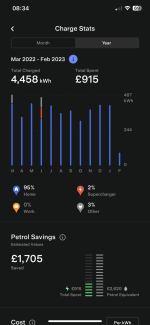You are using an out of date browser. It may not display this or other websites correctly.
You should upgrade or use an alternative browser.
You should upgrade or use an alternative browser.
When are you going fully electric?
- Thread starter Ricochet J
- Start date
More options
Thread starter's postsyou could tell us carbon content then ...I’ll give you one thing, you are consistent.
anyway the vw doc is 57g/km, not Tonnes over a 200K km lifespan so 11.4T manufacture .. but the ev's are still 30K km break even
Comparing the lifetime green house gas emissions of electric cars with the emissions of cars using gasoline or diesel
the vw article is about their carbon estimates - well known document, brought up before here.
carbon border taxes would have the EU impose up front charges on the imports according to carbon content, which might be more punitive, to ev's than battery/content limitations.
at seemingly $185tonne , that's only 2K$ for vw
3.2.1 ...
Soldato
- Joined
- 19 Oct 2002
- Posts
- 17,550
- Location
- Shakespeare’s County
Don’t need to tell you when you have google, much more informed than me remember.
Polestar 2 pack is around 7t dropping to 5.9 with the new CATL cells if that helps?
Polestar 2 pack is around 7t dropping to 5.9 with the new CATL cells if that helps?
Last edited:
... if I'm ready to pay for a premium guaranteed 150KW service then someone should meet that need
That depends on how many other people are also ready to pay that premium, and how much they're willing to pay. Maybe that that "someone" should be you, and you can pay to install your own private 150kw chargers wherever you want them?
Personally if the choice was between a few rows of 50kw chargers with a close to 100% guarantee that one would be available when I needed it, vs a handful of 150kw which were usually in use, I'd go for the first option every time
Nothing wrong with the Kem Power sharing approach. While there is not a certainty of getting the max speed, the reality is you probably will. They have arrays of small power modules in a central cabinet which can be switched to any plug on the site on the fly as demand from the car rises/falls. Most cars are not pulling anything like the max power most of the time.
The reason why I am a bit ‘meh’ on the instavolt upgrades is that it’s only split between 2 units. Where there are multiple pairs, you need to follow the urinal rule. The problem is people don’t get it in the real world.
The Kem Power solution scales a lot better and the information the stall puts out is excellent.
The reason why I am a bit ‘meh’ on the instavolt upgrades is that it’s only split between 2 units. Where there are multiple pairs, you need to follow the urinal rule. The problem is people don’t get it in the real world.
The Kem Power solution scales a lot better and the information the stall puts out is excellent.
 If any of you are thinking of electric but still umming and ahhing over "range anxiety" because of the fast charger farse displayed here.. I'll just say to you that the last time I used a public charger was June 2022! And I've done circa 15,000+ miles so far.
If any of you are thinking of electric but still umming and ahhing over "range anxiety" because of the fast charger farse displayed here.. I'll just say to you that the last time I used a public charger was June 2022! And I've done circa 15,000+ miles so far.For 99% of people *with a designated parking space. Its a complete non issue.
Last edited:
Don’t you mean 99% of people who have home charging capabilities?For 99% of people its a complete non issue.
That’s a big difference to 99% of all people.
And people who go further than 100miles away. How many miles is that out of interestIf any of you are thinking of electric but still umming and ahhing over "range anxiety" because of the fast charger farse displayed here.. I'll just say to you that the last time I used a public charger was June 2022! And I've done circa 15,000+ miles so far.
For 99% of people *with a designated parking space. Its a complete non issue.
Last edited:
And people who go further than 100miles away. How many miles is that out of interest

The Aberystwyth supercharger I used appears to be 115 miles from home.
I did a driving weekend with some mates hooning round the Black Mountains / Brecon beacons and then wild camped, with no electricity hookup, in the car (camp mode on) near Rhayader. Once we'd set up camp, I shot off to Morrisons for firewood and general bbq stuff we didn't have, I had one roundabout to cross via a Mcdonalds between supercharger and grocery shopping.... it was 100% charged when I got back literally zero waiting time.
20 mins wasted driving to and from the campsite to the supercharger though but then my mates couldn't light the bbq without me making that trip anyway.
I then did Sundays road trip, a pub and drove home fine. I did use the local shell (5 miles from home) as a test to see how much it cost me in total compared to mates. But would have made it home fine...
IIRC the V8 used £224 quid
The diesel used £120 odd
And I used £70 for the entire weekend.
Last edited:
R.e the home charging is it also dome via Octopus or similar? If so I'd say you need to offset the additional "daytime" rate (if you haven't moved enough to evening use)
Anyway a few weeks in to having an EV and I'm totally sold so far - it's not much of a driving experience but for running in to work in horrendous traffic and general running about it's peaceful and effortless which just makes the world seem like a calmer place! Glasgow also has some free charging left for now so an early morning start, stop off for free charge and do a bit of work is perfect.
I am looking forward to having better charging abilities when the MG arrives as the speed the ioniq charges at is it's biggest issue I'd say - ideally I'd give it a bit more power too, otherwise it's really hard to flaw in all honesty.
White goods EV motoring at its best
Anyway a few weeks in to having an EV and I'm totally sold so far - it's not much of a driving experience but for running in to work in horrendous traffic and general running about it's peaceful and effortless which just makes the world seem like a calmer place! Glasgow also has some free charging left for now so an early morning start, stop off for free charge and do a bit of work is perfect.
I am looking forward to having better charging abilities when the MG arrives as the speed the ioniq charges at is it's biggest issue I'd say - ideally I'd give it a bit more power too, otherwise it's really hard to flaw in all honesty.
White goods EV motoring at its best
Last edited:
Soldato
- Joined
- 19 Oct 2002
- Posts
- 17,550
- Location
- Shakespeare’s County
Here we go, the daytime rate myth. Yes you need to do very basic maths to work it out.
I left bulb the very day they announced they were going under, I joined octopus on a 2 year fix at 18p flat rate as my smart meter is still dumb ( smets1 waiting for software update)
The cheap rate that octopus can do if you have a working smart meter is pretty much tailored to night time (although you can shift it around a bit) the earliest I could see where it switched for 4 hours?... was 9pm, I am about ready to go to bed then, the only extra useage I'd get out of a cheap rate besides the car is putting the dishwasher / washing machine on.
The cheap rate that octopus can do if you have a working smart meter is pretty much tailored to night time (although you can shift it around a bit) the earliest I could see where it switched for 4 hours?... was 9pm, I am about ready to go to bed then, the only extra useage I'd get out of a cheap rate besides the car is putting the dishwasher / washing machine on.
if you are still on 18p/kWh then swapping to a time of use tariff wouldn’t make sense.
I’m on 20p/kWh still and don’t plan on moving as it would end up being more expensive.
The above comments I’m sure we’re on the basis on paying the SVR rates like almost everyone else is now. Unless you have battery storage as well, it probably wouldn’t make sense to give up 18p/kWh in the current climate.
I’m on 20p/kWh still and don’t plan on moving as it would end up being more expensive.
The above comments I’m sure we’re on the basis on paying the SVR rates like almost everyone else is now. Unless you have battery storage as well, it probably wouldn’t make sense to give up 18p/kWh in the current climate.
I worked out I only needed about 2000 miles worth of car charging to even out the "day penalty" from GO, with zero load shifting. With 5000 miles and shifting 500kWh overnight (about 20% energy usage) then I'm about £400/year better off on electricity costs even with the day penalty.Agree however if you change tariff and don't shift usage the increase can add up pretty quickly, especially impacting the charge saving for low mileage users
EDIT: Worked out the energy usage based on 4mi/kWh + 10% to cover charging losses. I've averaged 4.1mi/kWh over the last year according to the car dash.
Last edited:
That's what we found. Even with the higher day rate, the amount of overnight usage we have with two cars to plug in easily outweighs that penalty. We set the dishwasher and washing machine to go during the night rate also.I worked out I only needed about 2000 miles worth of car charging to even out the "day penalty" from GO, with zero load shifting. With 5000 miles and shifting 500kWh overnight (about 20% energy usage) then I'm about £400/year better off on electricity costs even with the day penalty.
EDIT: Worked out the energy usage based on 4mi/kWh + 10% to cover charging losses. I've averaged 4.1mi/kWh over the last year according to the car dash.
I think we are all in agreement, if the alternative is the current SVR rate.
When you are still on legacy rates, it’s less clear cut. I do about 2500kwh via my home charger and 3500kwh via the house and it’s significantly cheaper for me to stay on my legacy rate. That will change when my solar and batteries go in though.
When you are still on legacy rates, it’s less clear cut. I do about 2500kwh via my home charger and 3500kwh via the house and it’s significantly cheaper for me to stay on my legacy rate. That will change when my solar and batteries go in though.
Last edited:


